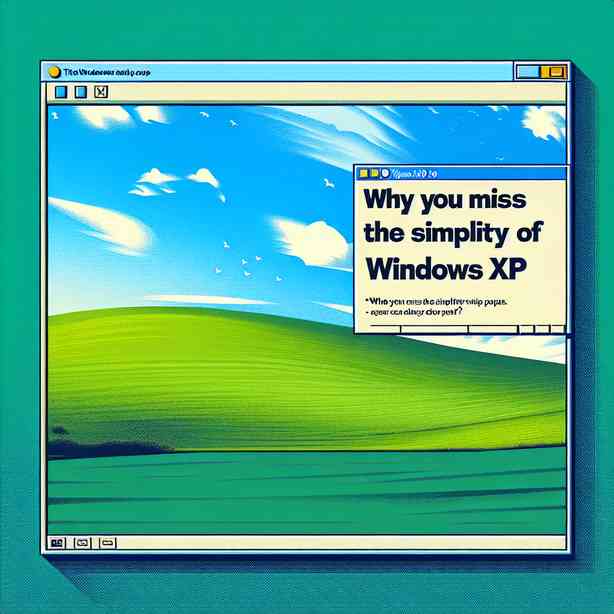
As we navigate the ever-evolving landscape of technology, it is common to reflect on the past, especially when it comes to operating systems. Windows XP, which was first released by Microsoft in 2001, holds a special place in the hearts of many users. Its simplicity and reliability set it apart, leading to nostalgia for an era when computing felt less complex and more accessible. This article will delve into the reasons why so many individuals miss the straightforward nature of Windows XP.
One of the most significant factors contributing to the fondness for Windows XP is its user interface. The interface was designed with user friendliness in mind, allowing individuals with varying levels of technical expertise to navigate the operating system with ease. The start menu was intuitive, providing quick access to applications, settings, and files. In contrast to the ribbons and tabs of modern operating systems, the simple layout of Windows XP enabled users to find what they needed without having to sift through layers of menus. This design philosophy emphasizes the importance of usability in technology and how a straightforward interface can create a more positive user experience.
Another aspect that users often reminisce about is the stability and performance of Windows XP. During its prime, XP was known for being reliable, with fewer crashes and error messages compared to its predecessors. This stability allowed users to focus on their tasks rather than troubleshooting software issues. Moreover, the system requirements for Windows XP were relatively low, making it accessible for a wide range of hardware configurations. As computers became more advanced, the demands of new operating systems increased, often leaving older hardware behind. This is not just a technical issue but also an emotional one, as users feel a connection to their devices, and a lightweight OS can breathe new life into older machines.
Compatibility is another reason for the nostalgia surrounding Windows XP. During its lifespan, Windows XP was compatible with a vast array of software applications and hardware peripherals, making it a versatile choice for users. Many individuals relied on specific programs that worked seamlessly with XP but have since become obsolete or incompatible with newer operating systems. This has left a gap for users who still wish to run familiar applications but find it challenging to do so on modern platforms. The ease of installation and configuration of software in XP often meant that users could set up their environment quickly, without facing the hurdles that are common today.
Furthermore, Windows XP fostered a sense of community among its users. Online forums, user groups, and communities emerged, allowing individuals to share tips, tricks, and resources. This collaborative spirit was fueled by a collective appreciation for the operating system, creating a sense of belonging among users. In the current technological landscape, where rapid advancements often leave individuals feeling isolated or overwhelmed, that sense of community is something many long for. The ability to connect with like-minded individuals who shared similar experiences and challenges helped cultivate a rich tapestry of support and camaraderie.
In addition to the above points, security features in Windows XP, though considered basic by today’s standards, were a significant improvement over previous operating systems. The introduction of a built-in firewall, automatic updates, and basic malware protection marked a shift towards a more secure user experience. Many users appreciated these enhancements, which eased some of the anxieties surrounding computer security at the time. However, as technology progressed, new threats emerged, and users are now faced with ever-increasing complexities in maintaining their security. The simplicity of Windows XP felt reassuring in a world where cybersecurity threats were less common and easier to manage per user’s understanding.
Moreover, the support provided by Microsoft for Windows XP contributed to its lasting legacy. Extended support for the operating system continued until 2014, enabling users to receive updates and technical assistance over a long period. This commitment by Microsoft gave individuals the confidence to rely on XP as their primary operating system for an extended duration. In contrast, many current operating systems have shorter support cycles, leading to feelings of urgency among users to upgrade frequently, which can be both frustrating and financially burdensome.
The sentimental value attached to Windows XP cannot be overlooked. For many, XP symbolizes a time when technology was simpler and more straightforward. Individuals often associate their experiences with achievements, memories, and milestones achieved while using this platform. These personal anecdotes contribute to the emotional connection users have with XP, ultimately leading to nostalgia for those “good old days.” In a fast-paced digital world, the longing for simplicity and familiarity is a natural human reaction.
Even as we embrace newer technologies, it’s essential to acknowledge the impact that Windows XP had on the industry. It set the standard for future operating systems in terms of usability, compatibility, and community engagement. The core principles that made XP successful can still inform the development of modern systems, guiding designers and engineers to focus on the needs and experiences of users.
In conclusion, the reasons for missing the simplicity of Windows XP are multifaceted. Its user-friendly interface, stability, compatibility, sense of community, and security features all contribute to a strong sense of nostalgia. As we continue to advance in technology, it’s vital to remember the lessons learned from XP: simplicity matters, usability is crucial, and creating a supportive community can enhance the overall user experience. Reflecting on these values may help guide the evolution of future operating systems, ensuring that technology remains accessible and enjoyable for all users. The charm of Windows XP reminds us that, sometimes, it is the simplest solutions that leave the most lasting impressions.


